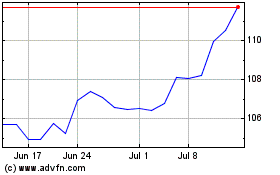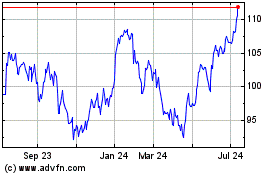FDA Says 'Data Manipulation' Occurred in Trials of World's Priciest Drug -- 2nd Update
August 06 2019 - 7:41PM
Dow Jones News
By Thomas M. Burton
WASHINGTON -- The Food and Drug Administration said "data
manipulation" took place during company studies of Zolgensma, the
world's most expensive drug, but officials said the gene-therapy
product still should stay on the market.
The medicine, which costs in the range of $2.1 million for a
one-time infusion, treats children with an especially devastating,
sometimes fatal form of spinal muscular atrophy. The FDA said it
was informed after the May 24 approval of the drug that there had
been a data-manipulation issue. That information came from AveXis
Inc. of Bannockburn, Ill., the product's maker and a unit of
Novartis AG.
Novartis said the data in question "were used for initial
product testing and are not currently used for commercial product
release."
"At no time during the investigation did the findings indicate
issues with product safety, efficacy or quality," the company said,
adding that it "is committed to taking appropriate action to
prevent future incidents across its portfolio of development
programs."
The company in the past has defended the lofty price by
comparing it to another treatment that Novartis said would cost
twice as much over a 10-year period.
Peter Marks, director of the FDA's biological-products center,
stressed that the company's report to the federal agency occurred
after approval even though the drugmaker "became aware prior to the
approval." He said the problem was reported by the chief quality
officer at AveXis. Dr. Marks said the manipulation of findings took
place in early testing in mice, and the FDA believes the problem is
confined to one assay used to measure the product's strength in
animals. He said he remains confident that the benefit-risk balance
still is favorable for the drug.
"We are very aware that gene therapy is in its early days," he
said. "We were not in a rush to approve this." He said civil or
criminal penalties can attach, however, in the case of a company's
reporting erroneous data to the FDA.
Infants with the malady have difficulty early on with motor
function like holding their heads up, sucking and breathing. These
conditions often can be present at birth or appear by the age of
six months.
"The FDA is carefully assessing this situation and remains
confident that Zolgensma should remain on the market," the agency
said in a statement. "Out of the large amount of submitted
information reviewed by the agency, our concerns at this time are
limited to only a small portion of the product testing data that
was contained in the marketing application." Still, the FDA takes
such cases of erroneous data very seriously, and Dr. Marks said
civil or criminal penalties could follow.
An FDA memo concluded that AveXis "appears to have become aware
of the data manipulation as early as March 14, 2019, more than two
months prior" to the FDA approval. It said the issue probably would
have delayed the approval, but that the agency "would have
ultimately approved" the drug anyway.
Zolgensma is among the first wave of gene-therapy products,
which treat or even cure diseases that have long been regarded as
death sentences. But the astronomical costs of the new medicines
are posing challenges to insurers, hospitals, patients and even
governments.
Spinal muscular atrophy is described as the most common genetic
cause of death in infants. It strikes 400 to 500 babies in the U.S.
each year. About 300 of those have the severe type that kills by
the age of 2.
The FDA announcement at the time of approval said that all 12
babies in the company study had reached age 2 and were able to hold
up their heads, eat by mouth and sit without help. Longer-term
prospects aren't known as yet.
Write to Thomas M. Burton at tom.burton@wsj.com
(END) Dow Jones Newswires
August 06, 2019 19:26 ET (23:26 GMT)
Copyright (c) 2019 Dow Jones & Company, Inc.
Novartis (NYSE:NVS)
Historical Stock Chart
From Aug 2024 to Sep 2024

Novartis (NYSE:NVS)
Historical Stock Chart
From Sep 2023 to Sep 2024
